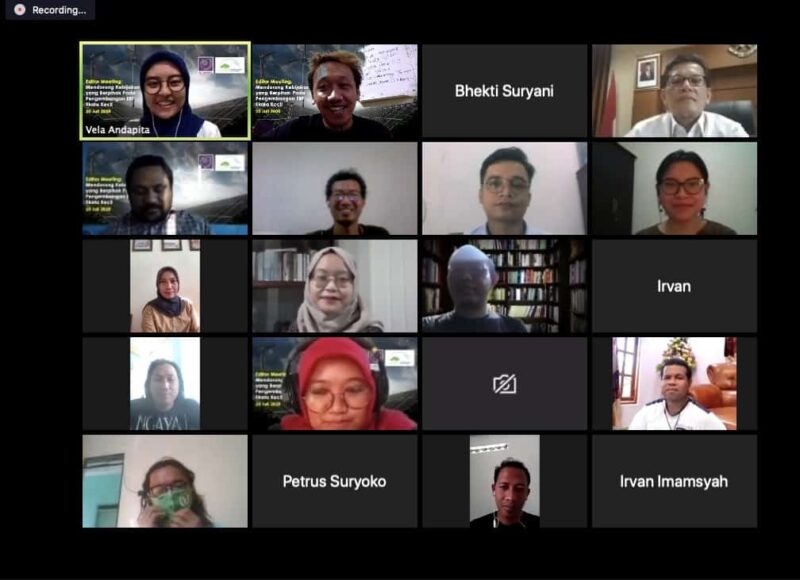By Vela Andapita
Journalists need to expose problems in Indonesia’s energy sector and investigate the actions of powerful officials at a time when the government is failing on its commitment to reduce the use of fossil fuels, according to editors who joined a recent virtual roundtable hosted by the Jakarta Alliance of Independent Journalists (AJI Jakarta).
The discussion on July 20th was organized as part of a partnership with Internews’ Earth Journalism Network (EJN), and attended by 15 editors from national and local media companies based in cities across Indonesia.
It’s part of a larger project supported by EJN to encourage reporters to do more in-depth stories about renewable energy and the challenges it faces in a country where coal is a key commodity.
The Indonesian government has announced a plan to boost renewable energy’s contribution to the national energy mix to 23% in 2025, but progress is far from promising, some of the editors at the roundtable said.
“They’ve stated the goal, they made the regulations, but in reality, we’ve seen that much of what they do contradicts their own mission,” said Sapariah Saturi, an editor at Mongabay Indonesia.
“They want to reduce the use of fossil energy, but they keep [extracting] extorting coal … It just doesn’t make sense to me,” she added.
Bhekti from Harian Jogja in Yogyakarta said despite all the problems plaguing the industry, journalists still mostly write inspirational stories, such as efforts by locals to bring electricity to their villages. She wanted journalists to open their eyes to the bigger issues.
“Those are good stories, but people need to know more about the reality behind our efforts to boost renewable energy, about conflicts between renewable energy players and the conventional energy actors who are bigger and stronger. We need to write more about that,” she explained.
Marthen Bana, an editor from Timexkupang.com in East Nusa Tenggara, said when certain renewable-energy initiatives are launched many journalists are there to cover the event, but they seldom follow up to see whether the project is being maintained or has been abandoned.
“These are also problems that need to be published,” he said.
Hariyanto, director of energy conservation at the Energy and Mineral Resources Ministry (ESDM), and Clorinda Wibowo, an energy access senior specialist at the World Resources Institute Indonesia also joined the conversation.
Hariyanto admitted that the government is facing endless challenges in boosting the growth of renewable energy. But he said the ministry is working to build more renewable power plants such as solar, biomass and biofuel.
Clorinda suggested that the government pay more attention to energy transition in the urban sector (domestic, industrial and commercial) since it dominates national energy consumption. She called on the government to enact better regulation and provide financial assistance to those who want to switch from using conventional energy to renewables.
Later this month AJI Jakarta will hold a workshop for reporters on the same topic and then launch a reporting fellowship to support in-depth reports about renewable energy in their cities.
“We need more discussions like this so that more journalists will have a better understanding about renewable energy, and therefore, we will have more coverage about it in the mass media,” Friska Kalia, an editor from KBR Radio, said following the roundtable.
